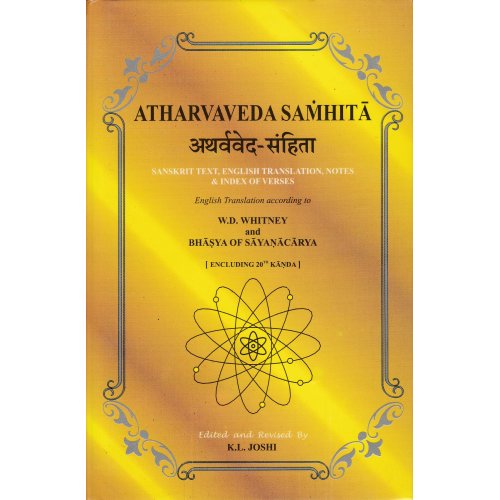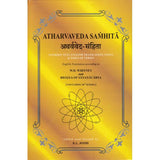Atharvaveda Samhita (Set of 3 volumes)
Atharvaveda Samhita (Set of 3 volumes)
$24.50
Atharvaveda Samhita (Set of 3 volumes)
English Translation according to W.D.Whitney and Bhasya of Sayanacarya,
Edited By K.L.Joshi
The Vedas are the most important record of the religion and the institutions of the Aryans. The last and the latest Veda is the Atharvaveda. This Veda is not included in the Trayividya, which proves its late origin. Alike every division or segment of Veda, Atharvaveda has its some characteristic on the basis of which a number of Veda learned persons consider it unique. The branches of the Vedas have their own particular directions but when we talk of Atharva Veda, it appears as it has embedded the corpus of life with all meanings in its ambit. The most cryptic mysteries of universe, the divine prays, applications of offerings (Yajniya), cure for the ailments, marriage, reproduction, family, social pattern and self- protection etc. all aspects of the universe and the human life are embedded with it. Pure science with the cryptic knowledge is include with others streams of Veda. But simultaneous to cryptic streams of the knowledge and science, Atharvaveda is an applied science too.
Out of the four Rtvija (performer of the offering as suggested by the Rsis for executing perfectly the offering ceremonies with an objective to make the life of pleasure and free from the pains and sorrows; the principal Rtvija Brahma is directly related to this very Veda. The place of Brahma among the Rtvijs of Council of offering is at the top. i.e. he is chairperson. The responsibility assigned to Brahma is to supervise the methods of offerings and rectify the errors. He can only handle such particular liability when all Vedas are well learnt to him. He should also possess a strong will power too. It has been stated in Gopatha Brahmana at 1.3.2 that – “Only a part of offering is processed by application of the three Vedas. The second part of it, is processed by Brahma through the application of mind or mental power.
Aitareya Bra. (5.33) declares that there are two routes for executing the offering – first is Vak (speech) and the other is mind. Three Vedas (Rk, Yaju, Sama) processes one part of offering through the speech and the other part is processed by Brahma through Brahmaveda (Atharvaveda) applied through the mind. This Veda mainly contains mantras used in which – craft or sorcery, in the curing of diseases, for destruction of enemies etc.
Actually, Atharvaveda describes the application of both type of ceremonies viz. Peaceful affirmation and the witchcraft (Abhicarika) ceremonies. A particular importance of such application has been accepted for the king. The king requires performing the Santika – Paustika deeds and Tulapurusa Mahadana etc…The priest should be expert in application of Atharva hymn and Brahmana. It has been mentioned in Atharvaparisista that the nation where resides the priest, expert in Santikarma and well learned to Atharvaveda, attains accession – to without any fear of invasions and disturbances. “Hence, it is necessary for a king that he should honour daily with pray, donation and respect to the priest well learned to Atharvaveda and commander of his sensory organs.
English Translation according to W.D.Whitney and Bhasya of Sayanacarya,
Edited By K.L.Joshi
The Vedas are the most important record of the religion and the institutions of the Aryans. The last and the latest Veda is the Atharvaveda. This Veda is not included in the Trayividya, which proves its late origin. Alike every division or segment of Veda, Atharvaveda has its some characteristic on the basis of which a number of Veda learned persons consider it unique. The branches of the Vedas have their own particular directions but when we talk of Atharva Veda, it appears as it has embedded the corpus of life with all meanings in its ambit. The most cryptic mysteries of universe, the divine prays, applications of offerings (Yajniya), cure for the ailments, marriage, reproduction, family, social pattern and self- protection etc. all aspects of the universe and the human life are embedded with it. Pure science with the cryptic knowledge is include with others streams of Veda. But simultaneous to cryptic streams of the knowledge and science, Atharvaveda is an applied science too.
Out of the four Rtvija (performer of the offering as suggested by the Rsis for executing perfectly the offering ceremonies with an objective to make the life of pleasure and free from the pains and sorrows; the principal Rtvija Brahma is directly related to this very Veda. The place of Brahma among the Rtvijs of Council of offering is at the top. i.e. he is chairperson. The responsibility assigned to Brahma is to supervise the methods of offerings and rectify the errors. He can only handle such particular liability when all Vedas are well learnt to him. He should also possess a strong will power too. It has been stated in Gopatha Brahmana at 1.3.2 that – “Only a part of offering is processed by application of the three Vedas. The second part of it, is processed by Brahma through the application of mind or mental power.
Aitareya Bra. (5.33) declares that there are two routes for executing the offering – first is Vak (speech) and the other is mind. Three Vedas (Rk, Yaju, Sama) processes one part of offering through the speech and the other part is processed by Brahma through Brahmaveda (Atharvaveda) applied through the mind. This Veda mainly contains mantras used in which – craft or sorcery, in the curing of diseases, for destruction of enemies etc.
Actually, Atharvaveda describes the application of both type of ceremonies viz. Peaceful affirmation and the witchcraft (Abhicarika) ceremonies. A particular importance of such application has been accepted for the king. The king requires performing the Santika – Paustika deeds and Tulapurusa Mahadana etc…The priest should be expert in application of Atharva hymn and Brahmana. It has been mentioned in Atharvaparisista that the nation where resides the priest, expert in Santikarma and well learned to Atharvaveda, attains accession – to without any fear of invasions and disturbances. “Hence, it is necessary for a king that he should honour daily with pray, donation and respect to the priest well learned to Atharvaveda and commander of his sensory organs.
| Vender | RasBihari Lal And Sons |
Atharvaveda Samhita (Set of 3 volumes)
English Translation according to W.D.Whitney and Bhasya of Sayanacarya,
Edited By K.L.Joshi
The Vedas are the most important record of the religion and the institutions of the Aryans. The last and the latest Veda is the Atharvaveda. This Veda is not included in the Trayividya, which proves its late origin. Alike every division or segment of Veda, Atharvaveda has its some characteristic on the basis of which a number of Veda learned persons consider it unique. The branches of the Vedas have their own particular directions but when we talk of Atharva Veda, it appears as it has embedded the corpus of life with all meanings in its ambit. The most cryptic mysteries of universe, the divine prays, applications of offerings (Yajniya), cure for the ailments, marriage, reproduction, family, social pattern and self- protection etc. all aspects of the universe and the human life are embedded with it. Pure science with the cryptic knowledge is include with others streams of Veda. But simultaneous to cryptic streams of the knowledge and science, Atharvaveda is an applied science too.
Out of the four Rtvija (performer of the offering as suggested by the Rsis for executing perfectly the offering ceremonies with an objective to make the life of pleasure and free from the pains and sorrows; the principal Rtvija Brahma is directly related to this very Veda. The place of Brahma among the Rtvijs of Council of offering is at the top. i.e. he is chairperson. The responsibility assigned to Brahma is to supervise the methods of offerings and rectify the errors. He can only handle such particular liability when all Vedas are well learnt to him. He should also possess a strong will power too. It has been stated in Gopatha Brahmana at 1.3.2 that – “Only a part of offering is processed by application of the three Vedas. The second part of it, is processed by Brahma through the application of mind or mental power.
Aitareya Bra. (5.33) declares that there are two routes for executing the offering – first is Vak (speech) and the other is mind. Three Vedas (Rk, Yaju, Sama) processes one part of offering through the speech and the other part is processed by Brahma through Brahmaveda (Atharvaveda) applied through the mind. This Veda mainly contains mantras used in which – craft or sorcery, in the curing of diseases, for destruction of enemies etc.
Actually, Atharvaveda describes the application of both type of ceremonies viz. Peaceful affirmation and the witchcraft (Abhicarika) ceremonies. A particular importance of such application has been accepted for the king. The king requires performing the Santika – Paustika deeds and Tulapurusa Mahadana etc…The priest should be expert in application of Atharva hymn and Brahmana. It has been mentioned in Atharvaparisista that the nation where resides the priest, expert in Santikarma and well learned to Atharvaveda, attains accession – to without any fear of invasions and disturbances. “Hence, it is necessary for a king that he should honour daily with pray, donation and respect to the priest well learned to Atharvaveda and commander of his sensory organs.
English Translation according to W.D.Whitney and Bhasya of Sayanacarya,
Edited By K.L.Joshi
The Vedas are the most important record of the religion and the institutions of the Aryans. The last and the latest Veda is the Atharvaveda. This Veda is not included in the Trayividya, which proves its late origin. Alike every division or segment of Veda, Atharvaveda has its some characteristic on the basis of which a number of Veda learned persons consider it unique. The branches of the Vedas have their own particular directions but when we talk of Atharva Veda, it appears as it has embedded the corpus of life with all meanings in its ambit. The most cryptic mysteries of universe, the divine prays, applications of offerings (Yajniya), cure for the ailments, marriage, reproduction, family, social pattern and self- protection etc. all aspects of the universe and the human life are embedded with it. Pure science with the cryptic knowledge is include with others streams of Veda. But simultaneous to cryptic streams of the knowledge and science, Atharvaveda is an applied science too.
Out of the four Rtvija (performer of the offering as suggested by the Rsis for executing perfectly the offering ceremonies with an objective to make the life of pleasure and free from the pains and sorrows; the principal Rtvija Brahma is directly related to this very Veda. The place of Brahma among the Rtvijs of Council of offering is at the top. i.e. he is chairperson. The responsibility assigned to Brahma is to supervise the methods of offerings and rectify the errors. He can only handle such particular liability when all Vedas are well learnt to him. He should also possess a strong will power too. It has been stated in Gopatha Brahmana at 1.3.2 that – “Only a part of offering is processed by application of the three Vedas. The second part of it, is processed by Brahma through the application of mind or mental power.
Aitareya Bra. (5.33) declares that there are two routes for executing the offering – first is Vak (speech) and the other is mind. Three Vedas (Rk, Yaju, Sama) processes one part of offering through the speech and the other part is processed by Brahma through Brahmaveda (Atharvaveda) applied through the mind. This Veda mainly contains mantras used in which – craft or sorcery, in the curing of diseases, for destruction of enemies etc.
Actually, Atharvaveda describes the application of both type of ceremonies viz. Peaceful affirmation and the witchcraft (Abhicarika) ceremonies. A particular importance of such application has been accepted for the king. The king requires performing the Santika – Paustika deeds and Tulapurusa Mahadana etc…The priest should be expert in application of Atharva hymn and Brahmana. It has been mentioned in Atharvaparisista that the nation where resides the priest, expert in Santikarma and well learned to Atharvaveda, attains accession – to without any fear of invasions and disturbances. “Hence, it is necessary for a king that he should honour daily with pray, donation and respect to the priest well learned to Atharvaveda and commander of his sensory organs.


